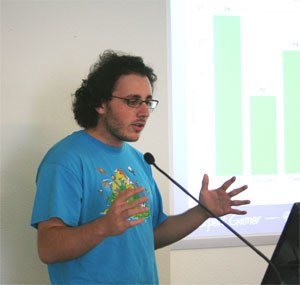SURF-IT Students Hone Presentation Skills
By Anna Lynn Spitzer
|
Irvine, Calif., July 31, 2009 -- Biomedical engineering student Bryce Kubo is creating microfluidic platforms for biomedical testing on plastic CDs, moving tiny particles around using valving, metering and dielectrophoresis techniques.
Isaac Mahgrefteh, computer science major, is developing tools that can search multimedia databases and extract specific images, an approach that can facilitate crime prevention, occupancy monitoring and social network analysis.
And informatics undergrad Sunhee Baik is crafting computer games to teach ethical behavior to school kids.
All three, along with their five fellow SURF-IT students, shared their current research efforts and findings with each other and additional guests at Tuesday’s practice presentation session. The eight undergraduates, who will make final research presentations at the end of their 10-week research program, had to explain and engage the audience in their work-to-date in just five minutes. Audience members gently critiqued the presentations, offering ideas for improving organization, content and delivery.
|
||||
Other presenters included:
Jason Tran, who is using his electrical engineering background to program software-defined radios that can transmit digital audio data over wireless ad hoc networks;
Computer sciences major Jakkree Janchoi, who is helping to develop a Web-enabled home-health monitoring system called Telios, which offers video conferences and customizable medical devices on Linux, Mac and Windows Web browsers;
James Milewski, an informatics major, who is interviewing and observing diabetes patients in pursuit of design and evaluation of information technology systems for personal health management;
|
Taylor Mar, who is tracking cognitive learning in video gamers as they play, in order to see if the popular form of entertainment can be adapted for use in the classroom;
And information and computer sciences student Alex Taubman, who is evaluating learning principles in these video gamers to determine how these narrowly defined “codes” influence learning and literacy.
Presenting their work for the first time may have induced temporary panic in the SURF-IT students but the exercise was an important one, according to program directors.
“The practice presentations are a valuable tool for preparing the students to present their research to others, whether it’s for the SURF-IT program or other audiences,” said Stu Ross, Calit2 assistant director for research development and a co-director of the summer fellowship program. “They learn to organize their thoughts, develop interesting graphics and connect with the audience. Those are skills they will use many times in their education and their careers.”





